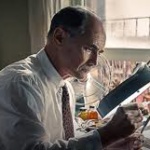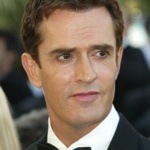by Rupert Wolfe Murray
Soviet Russia was a very visual place, for all the wrong reasons. The colours were dark and gloomy, the people were listless and misshapen (air hostesses and officials tended to be huge while gymnasts and the poor were stick-thin). These were the images that we were shown by Hollywood and the media. They weren’t false but they were selective and didn’t get across the main thing — the atmosphere.
I’ve just seen a rather brilliant film called Bridge of Spies. It was written by the Coen brothers, directed by Spielberg and starred Tom Hanks. It’s the story of the U2 spy-plane incident and the exchange-of-spies that followed. Most of the action is set in East Berlin.
They did a good job of re-creating the look of life in the Soviet Bloc — and I say this as someone who visited East Berlin, in 1986, when it was still under Communist rule — but they didn’t really get across the feel of it. In particular the ever-present feeling of fear. As a visitor to East Berlin in 1986 I sensed it; I knew that they could arrest me, imprison me, accuse me of anything, detain me forever, on a whim. I also knew they were unlikely to do so as I wasn’t a spy (I didn’t even have a job) even though I sometimes fancied myself as the next James Bond.

The actor who really steals the show in Bridge of Spies is Mark Rylance. He plays Rudolf Abel, the Russian spy who gets exchanged for Gary Powers (the captured U2 plane pilot). He won an Oscar for best supporting role but also managed to get across something of the dead-soul feeling of life under Communism. His character is melancholic, resigned to his fate, unfazed by arrest, interrogation, repatriation and a possible execution. It may sound boring but it’s not; it was a brilliant performance and it’s no wonder that Rylance is being touted as one of Britain’s greatest actors.
However, he doesn’t get across the feeling of the Soviet Bloc as well as an actor who would be the first to admit he wasn’t as good on stage as Mark Rylance.
Enter Rupert Everett
I’m not sure what to say about Rupert Everett as an actor. All I know him for is playing a voice in Shrek 2 (Prince Charming), a butler in a film about a monkey called Dunston and the Edwardian headmistress in a crappy remake of St Trinians. He plays fops, dandies, aristocrats and upper class twits — and is probably an essential ingredient to casting directors as there is an endless need for such characters.
What I can say about him is that he’s a great writer. I’m reading his autobiography — Red Carpets and Other Banana Skins — which has this Daily Mail quote on the front page: “Funny, outrageous and extremely well written.” Everett’s description of his early life are brilliant and his description of his homosexuality, in an age when it was still quite taboo, very honest. He’s self-deprecating about his own talents and would be harsher on himself than any critic. But he gets a bit boring when he writes about the life of excess with famous Hollywood stars and he drops names as if they are confetti.
What about Russia? You may be wondering.

Rupert Everett did make a film about Russia. He played the lead role, Grigor, in Slowly Flows the Don, a classic Russian story in the civil war which took place in the 1920s. It was directed by legendary filmmaker Sergei Bondarchuk, friend of Stalin and director of Mosfilm. The movie was a Soviet-Italian co-production and, like many films made under in the Soviet Union, had access to whole divisions of soldiers. Bondarchuk is famous for his production of War and Peace and with this film he was presumably aiming for something similar.
But it was not to be. Communism crashed, his soldiers deserted, the Italians went mad and the rushes ended up in a basement in Naples, embroiled in legal difficulties. It was never released.
When will I get to the point? Here it comes:
The whole point of this article is to introduce some passages about Russia that Rupert Everett wrote in his autobiography. These short descriptions, his impressions of Moscow in the early 1990s, get across the feel of the Soviet Bloc more effectively than anything I have read or seen on film.
Here’s an extract of what Everett wrote in his 33rd chapter:
There was a dead feeling in communist Russia. It banged into you as you stepped off the plane. Men in uniforms with blunt dull faces, tiny and cruel under enormous hats, went through my belongings item by item, endlessly examining a bottle of soy sauce, or a bag of rice. (I had brought a trunk of provisions). Others stood in groups with glassy, lobotomised eyes…
Miles and miles of crumbling tower blocks surrounded the city…Everything was falling to pieces. A porch hung precariously over a front door. Windowpanes were held together by tape and newspaper…
Inside, the crumbling studios were caked with years of mud and dust. Pipes with big rusting taps grew out of the ground, like living things, and ran along the walls and up over the street before diving back into the earth…
It was exhausting but this was communism. It had hit them over the head and now it hit me over the head. One had to slow down or die trying.
This seems authentic to me. You may be wondering who the hell am I to say it is authentic when I didn’t even visit Russia under Communism. I base my view on travelling through East Germany, Poland, Czechoslovakia, Hungary, Yugoslavia, Romania and Bulgaria, when they were all still part of the Soviet Bloc. During that trip in 1986 I had the same impressions as Everett describes in his book.
For me, Everett’s description reminds me of my own experiences in the Soviet Bloc. Just like Slumdog Millionaire was the first India film that reflected the atmosphere from my visits to India between 1984 and 1987.
Rupert Everett went to the Soviet Union and when he left, a year later, it was called Russia. He admitted that he was “vastly unsuited to the part in which I had been cast” — and it is this honesty, and lack of any attempt to explain what was going on politically, that makes his writing so valuable.
I wonder what else he’s written?
- 1917 (2019) - 11th January 2020
- The Shakespeare Soap Opera - 10th June 2016
- On the Road with Madame Bovary - 4th April 2016
